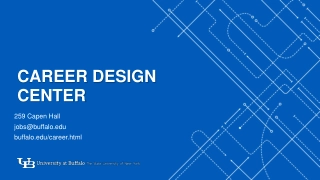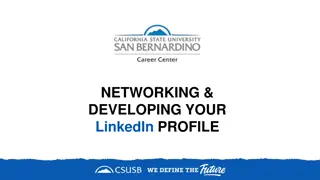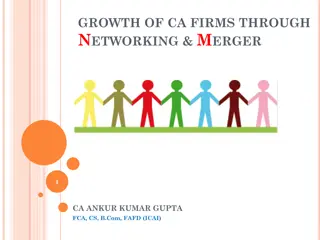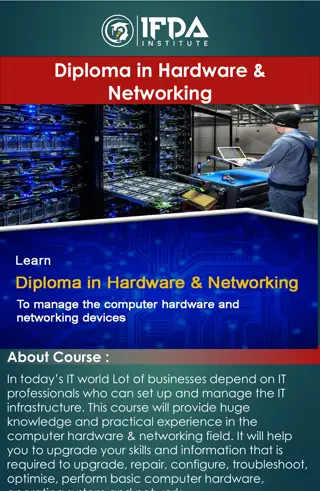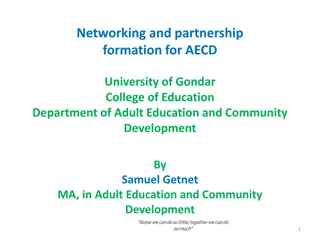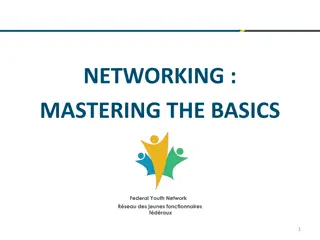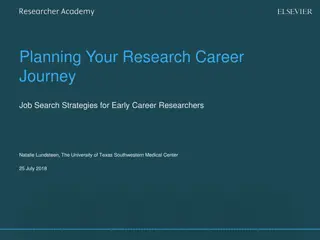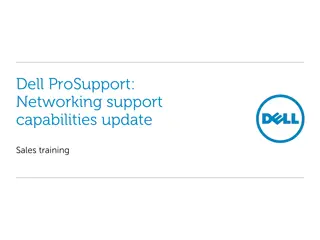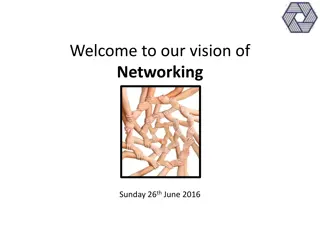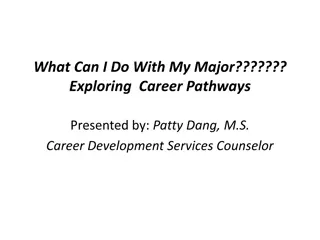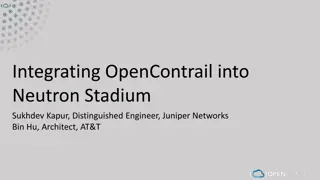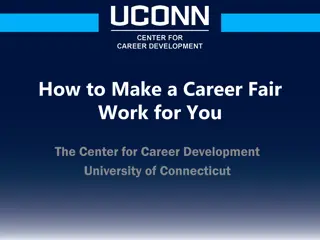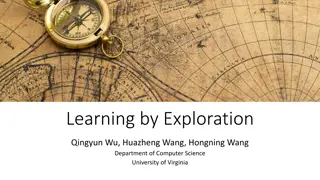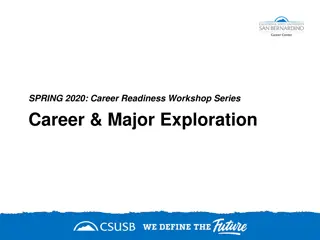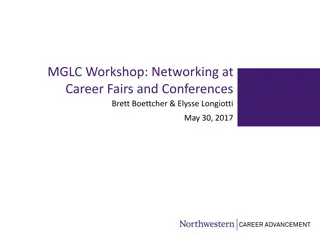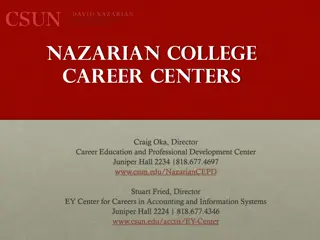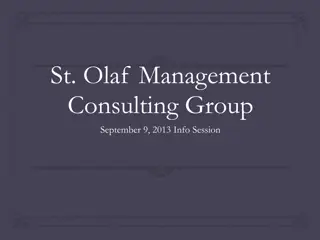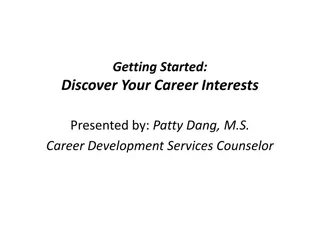Strategies for Career Exploration and Networking by Eamon Dubaissi
Explore valuable strategies for career exploration and networking by Eamon Dubaissi, a Research Staff Developer. Learn how to leverage research skills, map your warm network, and utilize LinkedIn to expand connections. Discover ways to take ownership of your career and advance towards your aspirations.
Download Presentation

Please find below an Image/Link to download the presentation.
The content on the website is provided AS IS for your information and personal use only. It may not be sold, licensed, or shared on other websites without obtaining consent from the author. Download presentation by click this link. If you encounter any issues during the download, it is possible that the publisher has removed the file from their server.
E N D
Presentation Transcript
Career exploration strategies Taking ownership of your career exploration Eamon Dubaissi Research Staff Developer
Session outcomes - Making use of your research skills for career exploration - Three strategies to further your career exploration - Reaching out and taking the next steps - Tasks for you to take away and try
Making use of your research skills Treat your career exploration as a research project
Applying your research skills to your career exploration Research skills refer to the collection of several separate skills that help you find and review information and arrive at a decision . Indeed.com Searching for information Problem solving Taking notes Time Attention to detail Communicating results management
Strategy 1 Mapping your warm network
What is your warm network? The people who you know and that know you in some kind of personal or professional capacity. Family and friends Colleagues and ex-colleagues Acquaintances
Why start with your warm network? Quick and simple way to start your exploration and get some ideas. Easy to have informal chats and they can provide support. Gets you started and provides motivation Can share your career aspirations and they can help you find other people to connect with Shared background gives you confidence that you can move forwards too
Plotting your network Person A Organisation Role What do they do? Person B Person F Organisation Role Organisation Role Who do you know? You Which careers interest you most? Person C Organisation Role Person E Organisation Role Person D Organisation Role
Using LinkedIn to expand your map LinkedIn is extremely powerful when expanding your network, but it can also be useful for looking at your current network. Under Settings and Privacy > Data Privacy > Get a copy of your data you can download your connections* Browse these connections to see if you have missed anyone in your warm network and add them to the map * Correct as of April 2023
Strategy 2 Expanding your knowledge of organisations
Career clusters or own insights Record Reach out and share your list Gather information information and thoughts Use your knowledge of your target area to find people for conversations Find out more about this organisation and expand to other ones Keep a list, spreadsheet or journal of your findings Identify an organisation of interest Could repeat process with an organisation in a different area LinkedIn Types of roles Reflect: would it suit you, your skills, strengths, values? Informational Interviews Networking
Tools to gather information Google type the name of an organisation of interest: gives their website and what People also searched for to identify competitors Organisation s website About Us section you can learn what they do and why they do it Business Databases universities often have access to business databases (e.g. Marketline, Nexis, D&B Hoovers) LinkedIn use the Search bar to find out more about organisations, roles and people
Example of how to expand your knowledge of organisations LettUs Grow is a company that designs technology for indoor and vertical farming
Expanding your network in your area of interest Start off small: share your list of organisations with friends and colleagues When you ve identified an organisation on LinkedIn, use the People tab on their page. Look for anyone you might know and browse their job titles. Send connection requests to people of interest Join professional groups on LinkedIn: you can identify more people and start to learn the language of professionals in this area Ask for informational interviews
Keep track of what you find out Do any organizations/roles particularly stand out for you? Can you rule others out? Is it still an area that interests you or do you need to look elsewhere? Remind yourself of your own skills, strengths, motivations and values? Is there a match?
Strategy 3 Searching job boards by skills
Quick poll: do you know what job boards are and have you ever used them?
In chat Can you give some examples of common job boards?
An agile job searching strategy Former academic, who then worked in the recruitment industry and is now a career coach Advocates for the use of a cross-platform, agile job searching strategy, using job boards for career exploration Emphasis is on searching by skills rather than job titles, so as to open up new areas and ideas that you might not have considered Tina Persson Ideal approach if you re not sure where to start and your looking for inspiration Allows you to familiarise yourself with using job boards Provides insight into the current labour market, which is always changing
Three major job boards Indeed, Glassdoor and LinkedIn can use them together Job titles: don t obsess about them, they may even limit you! Employers hire YOU, they might not always know what they want and your job title could change or be negotiated
Thinking like a headhunter Headhunters look to identify promising candidates by their skills so why not adopt the same strategy and search job boards by skills Identify your transferable and technical skills. Remind yourself of your strengths and the skills that you particularly like to use Look back at your skills inventory and frameworks for articulating transferable skills e.g. RDF and Eurodocs transferable skills
Strategy overview Go to the job description, can you find any new terminology/skills that you can use for another search? Input skills into the Indeed search bar. If too many hits can limit with PhD and/or discipline area Switch platforms to LinkedIn to identify people for follow up informational interviews Which job ads stand out? Organisations? Roles? Keep some notes or a list. Take a few of your preferred transferable (or technical) skills
Record your findings Remember to copy any job ads into your own documents because it will disappear when the deadline for applications passes If something interests you, note the reasons why and the name of the organisation, plus job titles you ve come across. The job ad may even list contact details of someone to find out more Don t be put off at this stage; remember the job description is a wish list it s rare for someone to tick all the boxes.
Switch platform to LinkedIn Search for the organisation of interest to you and identify people within that organisation Look for those people with a PhD in the organisation Look out for talent acquisition managers in larger organisations Basic LinkedIn account, connect with a note. Premium can send InMail. Be prepared, they may not reply but this is part of the process
Summary: three approaches to start taking ownership of your career exploration
Research skills People you know Mapping your warm network LinkedIn resources Reach out to people for more insight Expanding your knowledge of organisations Networking resources Career clusters Informational interview resources Searching job boards by skills Skills
Tasks Start to map your own network using the first strategy. Does anything stand out for you? Test the second strategy by identifying an organisation that interests you in the career clusters and using it to find more Try the third strategy, searching job boards with some of the skills you particularly like to use Reach out to someone on LinkedIn if you feel ready Make a template to start recording your findings
Thank you. Get in touch: prosper.postdoc@liverpool.ac.uk https://prosper.liverpool.ac.uk Twitter: @ProsperPostdoc Except where otherwise noted, this work is licensed under the Creative Commons Attribution-NonCommercial- ShareAlike 4.0 International License. To view a copy of this license, https://creativecommons.org/licenses/by-nc-sa/4.0/



